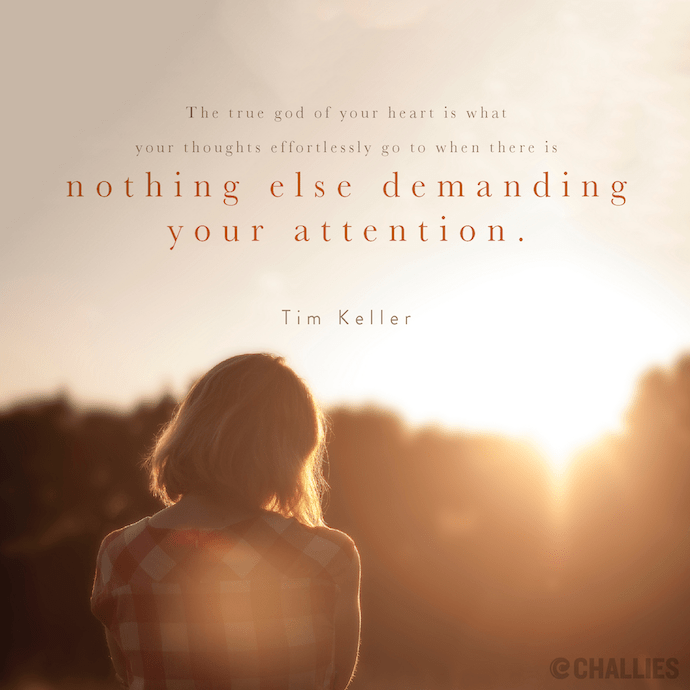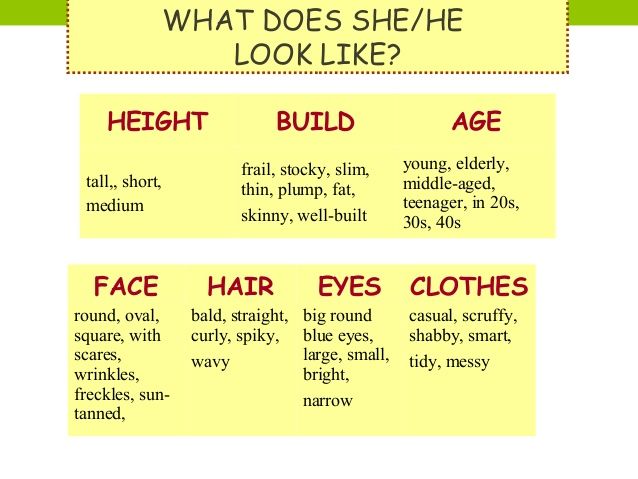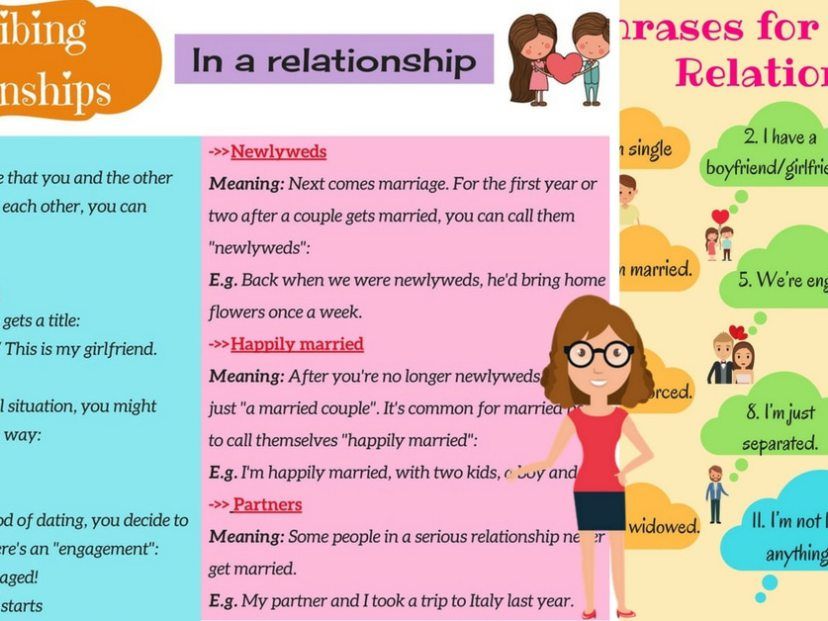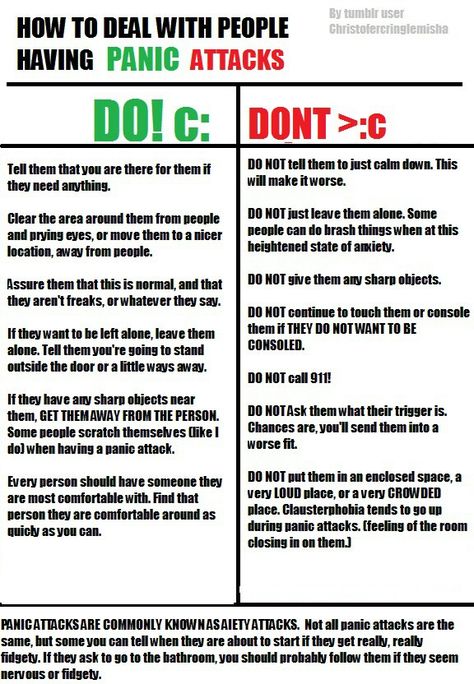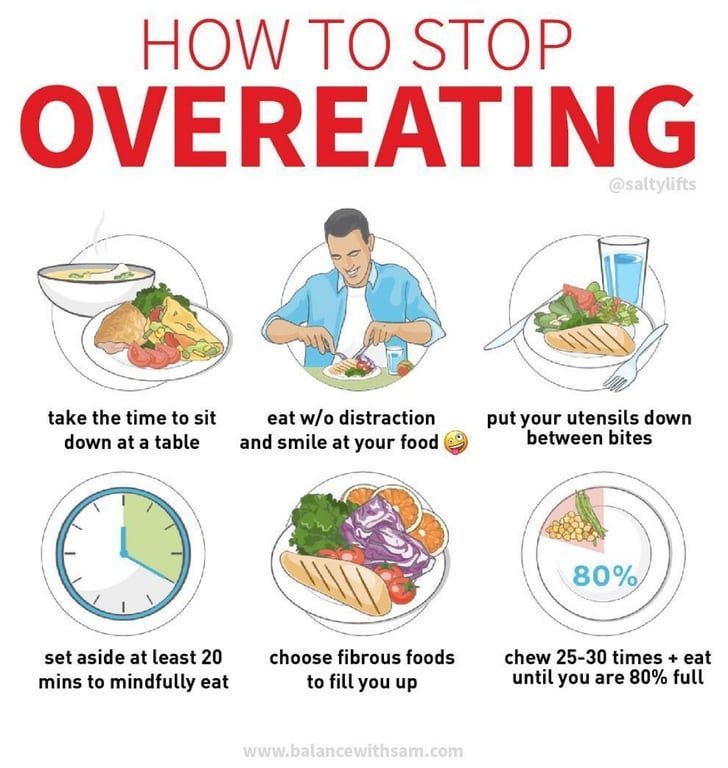Dizzy panic attack
How Panic Attacks Cause Dizziness
Panic attacks are one of the most severe forms of anxiety. They are intense events with dozens of symptoms all going on at once, combined with a fear that something terrible is happening to you. One of the symptoms that causes that fear is dizziness.
This article will explore panic attack dizziness, and provide you with a helpful way of controlling it.
Dizziness As A Trigger
Dizziness can be a frightening symptom, especially because it is associated with dangerous conditions and can make you feel like you're going to faint.
Dizziness is actually a fairly common trigger of panic attacks. A person is walking along, starts to feel dizzy, and that dizziness then triggers a cascade of symptoms that ultimately become a full blown panic attack.
Dizziness As A Symptom
Of course, dizziness is one of the symptoms of anxiety. Often as a panic attack gets worse, the person starts to feel increasingly dizzy, and may feel as though they are in the process of passing out. It is often combined with lightheadedness, and possibly even a little bit of nausea, which both combine to make the dizziness scarier. Often those that experience dizziness start to become even more anxious after the symptom occurs, making the panic attack significantly worse.
What Causes Panic Attack Dizziness
Anxiety attacks are complex, and symptoms can be caused by a host of different bodily and brain changes. However, the most common cause of dizziness is hyperventilation. During anxiety attacks, you tend to breath faster and less efficiently, taking in more oxygen than you need and breathing out too much carbon dioxide. Your body adjusts to this by constricting your blood vessels.
When your blood vessels are constricted, it reduces blood flow to your brain. As scary as that sounds, it's not dangerous, but it can cause you to feel dizzy, and in some cases that dizziness can be extreme.
Dizziness and Anxiety
Hyperventilation is not the only cause of dizziness.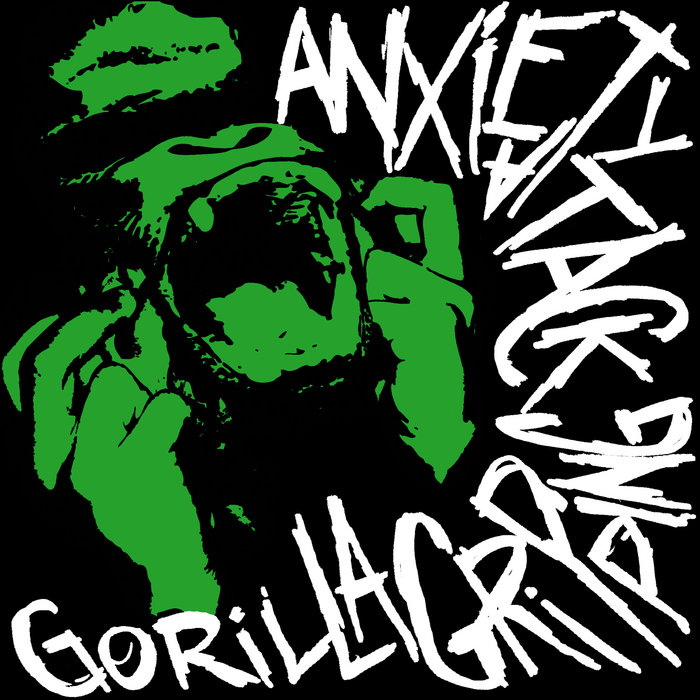 Some people experience dizziness during times of intense stress. Others find that adrenaline causes them to feel dizzy. Others are not dizzy at all, but start to feel like the world is spinning when they are lightheaded. All of these are caused by anxiety and panic.
Some people experience dizziness during times of intense stress. Others find that adrenaline causes them to feel dizzy. Others are not dizzy at all, but start to feel like the world is spinning when they are lightheaded. All of these are caused by anxiety and panic.
How to Stop Dizziness
Stopping your panic attacks may require a comprehensive treatment plan that can help you control your anxiety attacks altogether. But you can actually combat dizziness specifically, and reduce the effects of this sensation as both a trigger and a symptom of panic.
Your mind is incredibly adaptable, in ways that are almost automatic. When something doesn't cause an expected reaction, your mind learns to adjust. For example, let's say you're afraid of spiders. If you were in a room with a spider for several days and nothing happened, your mind would stop feeling fear at the sight of a spider. At first you would experience a lot of fear, but after a while it will get used to the spider and no longer experience that same level of fear.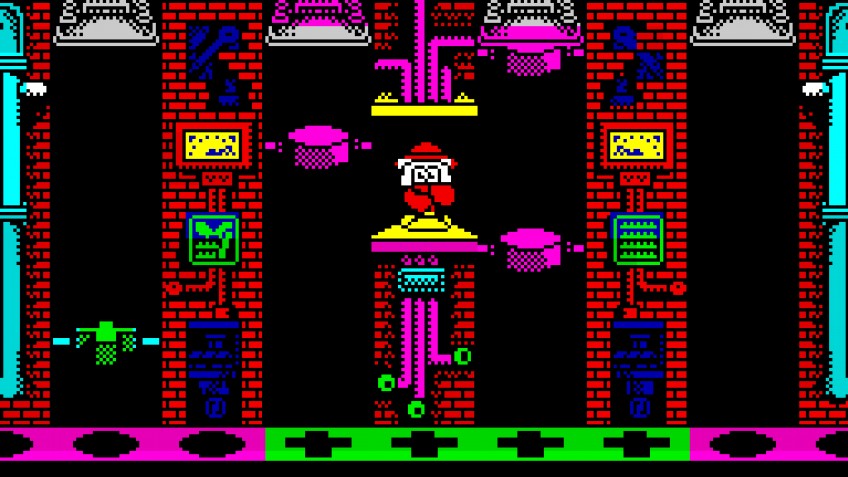 This process is called "Desensitization."
This process is called "Desensitization."
You can use desentization to your advantage. Try the following:
- With someone around you for comfort and support, spin around in a chair until you feel dizzy. Wait until you calm down. If you feel anxiety, that's okay. Try to calm yourself and wait until the symptom fades. Make sure that you’re breathing slowly and steadily in order to promote relaxation. Continue this process on and off until you’re more comfortable with that sensation of dizziness. If you feel sick, take a break, but consider coming back to it as soon as you feel better.
- Try spinning around in multiple ways and becoming dizzy in multiple ways. Stand up and spin in a circle. Have your friend spin you around. Spin around blindfolded. Try different experiences so that you can adjust to all of them.
- Once you’ve tried this with a trusted friend or family member, try doing this exercise alone in your home. Sometimes you'll find it's a little harder when you're alone.
 That's okay. If you're able to push through and perform the exercise anyway, you’ll likely increase your self-confidence and feel a greater sense of control over your symptoms.
That's okay. If you're able to push through and perform the exercise anyway, you’ll likely increase your self-confidence and feel a greater sense of control over your symptoms. - Next, and finally, take it outside. Do it in unusual environments. However, only try this once you are completely comfortable performing the exercise alone in your own home. Have a friend with you in case you feel sick, but note that even if you have a panic attack, you should try to keep going after a short break. The more you get dizzy in interesting places, the more you'll get used to the experience and the less anxiety-provoking it will become.
This type of desensitization isn't perfect, and it certainly will not cure your panic attacks altogether, but it helps you get used to physical sensations that spark anxiety and fear. Over time, if you combine this with other treatment ideas, you'll be able to be better in control of your panic. If you find that you’re not entirely able to benefit from this sort of a process on your own, that’s okay - it doesn’t work for everyone. We still encourage you to still find other ways of managing your anxiety - desensitization is just one of many evidence-based strategies.
We still encourage you to still find other ways of managing your anxiety - desensitization is just one of many evidence-based strategies.
Was this article helpful?
- Yes
- No
Anxiety and Dizziness: What's the Connection?
Chronic anxiety can cause a wide range of symptoms, including headaches and dizziness. In fact, dizziness commonly accompanies both acute and chronic anxiety. Additionally, people with inner ear disorders, which can cause dizziness, may be at an increased risk of developing an anxiety disorder.
Anxiety disorders affect over 18 percent of the population, or more than 40 million adults in the United States every year.
In this article, we’ll discuss the connection between anxiety and dizziness, including other possible symptoms, treatments, and when to seek professional help.
Dizziness is an umbrella term for multiple sensations, such as lightheadedness or vertigo, that cause unsteadiness due to the illusion of movement.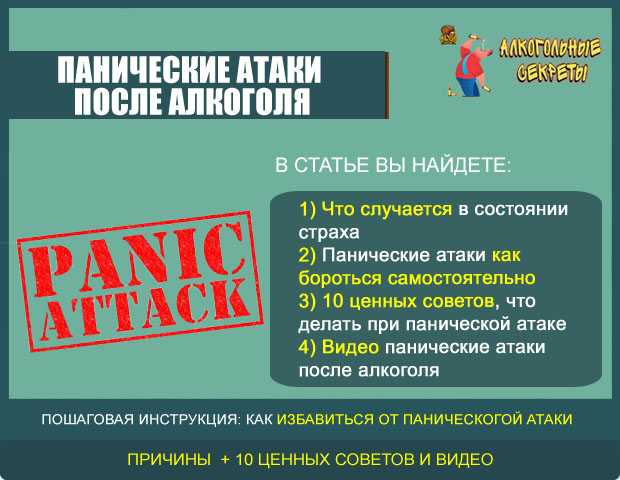 Dizziness can be triggered by multiple underlying problems, such as vestibular, neurological, or psychiatric issues.
Dizziness can be triggered by multiple underlying problems, such as vestibular, neurological, or psychiatric issues.
Anxiety is the natural response to stress that triggers the sympathetic nervous system, allowing the body to prepare to fight, run away, or freeze. Anxiety can be acute, such as the nervousness you feel before a date, or chronic, such as when you have an anxiety disorder.
Fight or flight response
Anxiety and anxiety disorders often cause feelings of dizziness, among other similar symptoms. Sometimes this is due to sudden changes in blood pressure, which can lead to feelings of wooziness or lightheadedness.
More often, it’s simply due to the impact that stress hormones, such as adrenaline and cortisol, can have on the vestibular system of the inner ear.
Inner ear disorders
Vestibular disorders, also known as inner ear disorders, are also linked to increased anxiety, especially in conditions that cause severe disability.
In some cases, having a vestibular disorder that causes chronic episodes of dizziness or vertigo may even increase the risk of developing an anxiety disorder.
BPPV
For example, in one cohort study from 2016, researchers followed over 15,000 participants for a period of 9 years to determine the risk of developing benign paroxysmal positional vertigo (BPPV).
Between the participants who had anxiety disorders and the participants who didn’t, the researchers found that those with anxiety disorders were more than twice as likely to develop BPPV.
Researchers also observed an increased risk of developing BPPV if the person was female or had cerebrovascular disease.
Vertigo
In a more recent study, researchers investigated the correlation between anxiety, disability, and quality of life in participants with vertigo. Results of the study indicated that almost all participants experienced some level of anxiety, ranging from mild to severe.
However, people whose dizziness was more severe were found to have increased anxiety and disability and lower quality of life.
According to research, stress hormones, which include cortisol, histamines, and other compounds that are released during the stress response, have an impact on vestibular function.
Many of these hormones can influence the homeostatic balance of the inner ear at the cellular level, which can lead to a change in the entire system.
As for the correlation between balance disorders and anxiety, the National Institute of Mental Health (NIMH) explains that having a chronic illness is linked to an increased risk of developing a mental health disorder.
When conditions like BPPV and vestibular migraine make it difficult to function in everyday life, it can cause an increase in symptoms of anxiety and depression.
Dizziness isn’t the only symptom that can be caused by anxiety. In fact, anxiety causes a wide range of symptoms that differ in severity depending on the person. Other symptoms of anxiety may include:
- nervousness, panic, or dread
- rapid heart rate or chest pain
- difficulty breathing or hyperventilation
- chest pain or pressure
- shaking, trembling, or twitches
- cold chills or hot flashes
- numbness or tingling in the extremities
- weakness or fatigue
- nausea, vomiting, or diarrhea
- poor focus or concentration
- sharp or blurred vision
- sense of detachment
When is it an emergency?Most of the symptoms of anxiety are not dangerous.
However, if you are experiencing dizziness and chest pain that is severe and lasts longer than 15 minutes, seek medical help immediately.
Chronic dizziness that is caused by an underlying condition, such as an inner ear disorder, may benefit from the following treatment options:
- Physical therapy. Physical therapy is the standard treatment option for vestibular disorders, such as BPPV, vestibular migraine, and Meniere’s disease. Exercises that focus on the head and eyes, walking, and balance can all be used to help reduce the severity of dizziness and vertigo episodes.
- Medications. When physical therapy is not enough to alleviate the dizziness, medication may be used to help relieve symptoms. Medications that are commonly prescribed for vestibular disorders include:
- diuretics
- antidepressants
- beta-blockers
- calcium channel blockers
Dizziness that is caused by an underlying anxiety disorder should improve with anxiety treatments, such as:
- Psychotherapy.
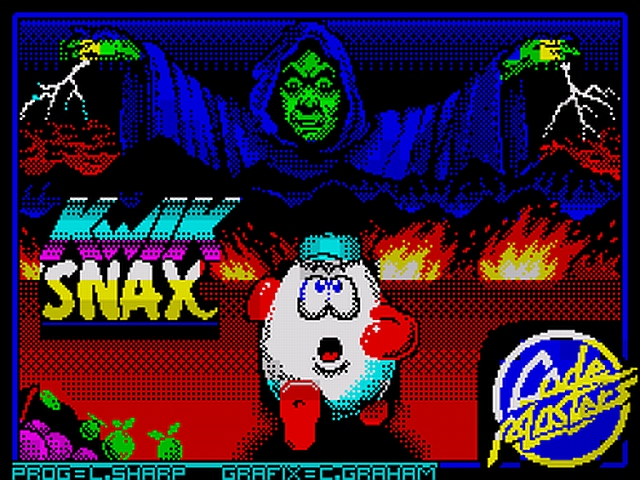 Psychotherapy techniques such as cognitive behavioral therapy (CBT) have a long history of success in treating anxiety disorders. Increasing self-awareness of anxiety and learning coping skills can help reduce some of the symptoms of chronic anxiety.
Psychotherapy techniques such as cognitive behavioral therapy (CBT) have a long history of success in treating anxiety disorders. Increasing self-awareness of anxiety and learning coping skills can help reduce some of the symptoms of chronic anxiety. - Medications. Antidepressants are the most commonly prescribed medication for both depression and anxiety disorders. Most times, medications are used in combination with psychotherapy to produce long-term reductions in anxious feelings and symptoms.
- Lifestyle changes. In addition to therapy and medications, relaxation techniques can be an essential part of managing daily stress levels. Meditation, yoga, and gentle exercise are just a few ways to reduce the everyday symptoms of anxiety and stress.
Frequent dizziness tends to lead to increased anxiety, while chronic anxiety often causes chronic dizziness. Sometimes, this relationship can create a vicious circle that is hard to break without taking steps to relieve symptoms.
Making lifestyle changes, such as eating a well-rounded diet, practicing relaxation techniques, and getting professional help can help improve quality of life in people with both anxiety and vestibular disorders.
If you have been experiencing dizziness that does not go away or has begun to interfere with your ability to function, talk with a medical professional. In most cases, testing will reveal the underlying reason behind these episodes, and treatment can help reduce — or even stop — the symptoms.
Sometimes, there is no visible cause for frequent dizziness. This may indicate an underlying condition such as anxiety. If this is the case, you may be referred to a therapist or other mental health professional for treatment.
Anxiety and dizziness have a reciprocal relationship in which anxiety can cause dizziness, and dizziness can cause anxiety. Research has shown that in many cases, dizziness and anxiety go hand-in-hand, which can sometimes create a loop of chronic symptoms.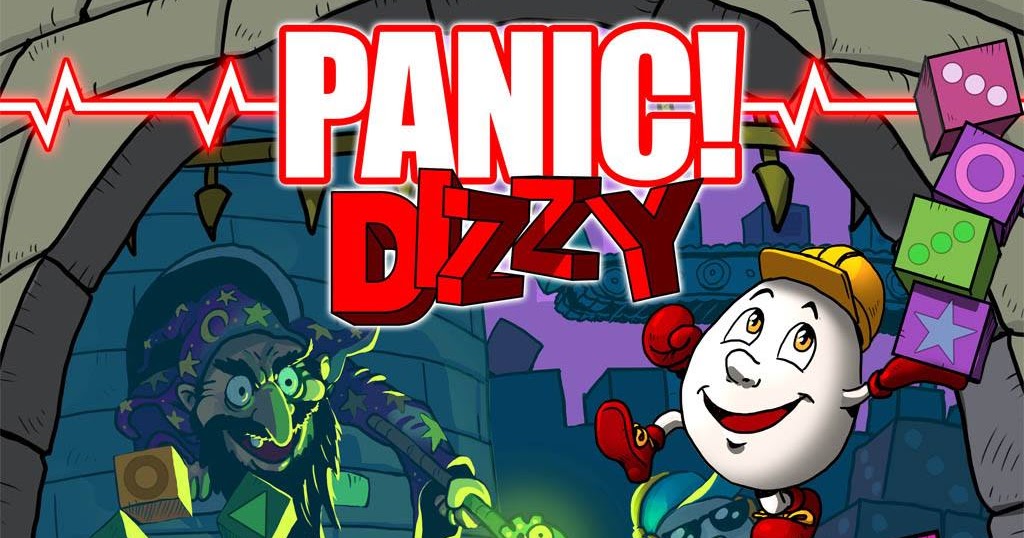
By treating the underlying cause — whether physical or psychological — you can relieve the symptoms of dizziness and improve your overall quality of life.
"X-Clinic" article - Symptoms of panic attacks and how to deal with them The editors of WMJ.ru talked to a psychotherapist and learned everything about panic attacks firsthand. Details - in our material!
What is a panic attack
A panic attack is an attack of sudden fear and intense anxiety for no apparent reason. The origins of panic disorder are not entirely clear. However, it is believed that the disease has a genetic predisposition and more often affects the fair sex. Women are more prone to panic attacks and suffer from this disorder 2-3 times more often than men. nine0003
Panic attacks cannot lead to death, despite the fact that this is the sensation that most often accompanies them. The more frequent attacks occur, the worse the quality of life becomes. People who have repeatedly experienced panic attacks become increasingly anxious and subconsciously try to avoid places or situations where and when they succumbed to fear. Those who have ever experienced an attack at night, subsequently face sleep disorders.
People who have repeatedly experienced panic attacks become increasingly anxious and subconsciously try to avoid places or situations where and when they succumbed to fear. Those who have ever experienced an attack at night, subsequently face sleep disorders.
What are the symptoms of a panic attack
A panic attack is a case of an attack of fear with a sense of imminent death or anxiety, accompanied by certain symptoms. Most often, these include: rapid heartbeat and pulse, sweating, chills or a feeling of heat, tremors, shortness of breath and suffocation, dizziness, fainting, fear of death, and others. If 4 of the symptoms listed above are present, we can talk about an attack of a panic attack.
What to do in case of a panic attack
The most important thing to do during a panic attack is to shift your attention. Any method is fine for distraction. If the attack caught you in a public place, then you can clench and unclench your fists, rub your earlobes or step from foot to foot.![]() If the panic caught you by surprise at home, try turning on the music, start doing household chores: washing dishes, dusting. Any activity that involves muscle work and requires attention will do. nine0003
If the panic caught you by surprise at home, try turning on the music, start doing household chores: washing dishes, dusting. Any activity that involves muscle work and requires attention will do. nine0003
Since a panic attack is accompanied by a rapid heartbeat and a feeling of stuffiness, it will not be superfluous to take a couple of sips of water and concentrate on breathing. It is best to learn a few techniques that will quickly relieve tension. In case of an attack, start with an exhalation - slow it down, and the pulse will also slow down. The ratio of the length of inhalation and exhalation should be 1:2. You can experiment and choose the technique that will help you. A smartphone can also help to distract from panic. Games, social networks - all this will switch attention and distract from a panic attack. nine0003
How normal anxiety differs from a panic attack
The mechanism that triggers a panic attack is no different from what causes ordinary anxiety - both are psychophysical reactions to danger. The difference is that a panic attack is a reaction to danger in the absence of danger. Nevertheless, a false alarm triggers the same cascade of reactions as a normal alarm - the sympathetic system is activated, adrenaline is released.
The difference is that a panic attack is a reaction to danger in the absence of danger. Nevertheless, a false alarm triggers the same cascade of reactions as a normal alarm - the sympathetic system is activated, adrenaline is released.
A panic attack can occur against the background of excessive physical exertion, overwork and exhaustion, as well as against the background of the abuse of stimulants and alcohol. In addition, stress and unresolved conflict situations can provoke an attack. Lack of understanding of one's own experiences and feelings, a tendency to avoid negative emotions and ignore them also increase vulnerability to panic disorder.
How to prevent a panic attack from turning into a panic disorder
Panic disorder is characterized by a number of symptoms, one of which is a panic attack. In order to make a diagnosis of "panic disorder", it is necessary that panic episodes manifest themselves constantly for a month and are not associated with threats, dangers and previous diseases. In addition, attacks should be accompanied by the following symptoms: anxiety about the repetition of attacks, loss of self-control, a sharp change in behavior. nine0003
In addition, attacks should be accompanied by the following symptoms: anxiety about the repetition of attacks, loss of self-control, a sharp change in behavior. nine0003
How to treat panic attacks and when to see a specialist
Seeing a specialist for recurring panic attacks is a must. Therapy is selected individually and, as a rule, includes psychotherapeutic work and drug therapy. Psychotherapy implies a variety of techniques aimed at understanding and understanding the causes of problems, learning how to deal with the symptoms of the disease, methods of relaxation. Psychotherapy can take place in the form of individual meetings with a psychotherapist or in the form of group sessions with other patients. Drug therapy for panic disorder is carried out with various drugs that help reduce anxiety and fear. Appointment, correction of dosages and cancellation of treatment must be carried out under the supervision of a physician. nine0003
Modern neurotechnologies can also help in the treatment of panic attacks. Neurofeedback training methods have been developed for patients with panic disorder. During trainings, patients learn to manage their emotional state, they form new neural connections, and the level of anxiety decreases. In addition to professional help, lifestyle plays an important role in the treatment and prevention of panic attacks. Try not to abuse alcohol and caffeine, rest more, go in for sports, yoga is better. nine0025
Neurofeedback training methods have been developed for patients with panic disorder. During trainings, patients learn to manage their emotional state, they form new neural connections, and the level of anxiety decreases. In addition to professional help, lifestyle plays an important role in the treatment and prevention of panic attacks. Try not to abuse alcohol and caffeine, rest more, go in for sports, yoga is better. nine0025
Source: https://www.wmj.ru/krasota/telo/golovokruzhenie-zhar-i-dazhe-udushe-simptomy-panicheskikh-atak-i-kak-s-nimi-borotsya-razbiraem-s-vrachom.htm
Back to the list
What is a panic attack? | doc.ua
A panic attack is a brief episode of intense anxiety that causes physical sensations of fear, such as rapid heart rate, shortness of breath, or dizziness. Panic attacks occur frequently and unexpectedly and are usually not associated with any external threat. This is a very common ailment that occurs in about 35% of people at least once in a lifetime. Read more about what panic attacks are in the article. nine0060
Read more about what panic attacks are in the article. nine0060
Causes of panic attacks
When the body is faced with immediate danger, the brain instructs the autonomic nervous system to activate the fight-or-flight response. The causes of panic attacks are that the body is flooded with a number of chemicals, including adrenaline, which cause physiological changes. For example, heart rate and breathing increase and blood rushes to the muscles to prepare for physical fight or flight.
A panic attack is said to occur when the fight-or-flight response is triggered, but there is no danger. A person may experience panic attack symptoms in harmless and apparently stress-free situations, such as watching TV or sleeping. nine0003
What triggers a panic attack? Some of the factors that can cause the body to inappropriately activate the fight-or-flight response include:
- chronic (permanent) stress - this causes the body to produce higher than normal levels of stress chemicals such as adrenaline;
- Acute stress, such as experiencing a traumatic event (panic attack after the death of a loved one), can suddenly flood the body with large amounts of stress-inducing chemicals; nine0073
- intense exercise - some people may experience a panic attack after sports;
- excessive consumption of caffeine (panic attacks after coffee) - caffeine in coffee, tea and other drinks is a strong stimulant;
- illness, e.
 g. panic attack after covid;
g. panic attack after covid; - sudden change in environment, such as moving into a crowded, hot or stuffy place.
Types of panic attacks
Panic disorders are divided into the following types:
- Spontaneous or unplanned panic attacks occur without warning or out of the blue. No situational or environmental triggers are associated with the attack. These types of panic attacks can even occur during sleep.
- Anticipated or situational panic attacks are panic attacks that occur when actually or expectedly exposed to certain situations. These situations become signals or triggers for a panic attack. For example, a person who is afraid of enclosed spaces (claustrophobia) might expect panic attacks in elevators or other tight spaces. A person who is afraid of flying (aerophobia) can predictably have a panic attack while boarding an airplane, during takeoff, or at some point during a flight.
 For example, a person with a fear of enclosed spaces may experience a panic attack upon entering or the thought of entering an elevator. nine0073
For example, a person with a fear of enclosed spaces may experience a panic attack upon entering or the thought of entering an elevator. nine0073
- Conditioned panic attacks is a type of panic attack that occurs due to a chemical or biological trigger of the nervous system, such as a panic attack after alcohol, smoking or drugs. It can also occur with changes in hormonal levels, for example, a panic attack during pregnancy or after childbirth.
Panic Attack Test
We invite you to take a short panic attack test to determine if you have one. Answer “yes”, “no” or “not sure” to the 21 questions below. nine0003
- Do you have anxiety or panic attacks?
- Do you have attacks during which you do not feel much anxiety, but are uncomfortable with the sudden and rapid development of some physiologically unpleasant symptoms?
- Is there pulsation, strong heartbeat, fast pulse?
- Is there sweating?
- Does it cause chills, tremors, a feeling of internal trembling?
- Is there a feeling of lack of air, shortness of breath? nine0073
- Is there pain or discomfort in the left side of the chest?
- Is there nausea or discomfort in the abdomen?
- Do you feel dizzy, unsteady, or faint at such times?
- Does everything around you feel strange, unreal, foggy, or detached?
- Is there a fear of going crazy or acting out of control?
- Is there a feeling of numbness or tingling in the arms or legs? nine0073
- Does it feel like waves of heat or cold are passing through the body?
- Are these symptoms accompanied by fear of death (thoughts of death or a sense of imminent death)?
- Do these attacks last an average of 15 to 30 minutes (or longer)?
- Is it common for you to experience states of general weakness and weakness after such attacks?
- Do you have a sensation of a lump in your throat at such moments?
- Do they cause you a feeling of constant anxiety and fear associated with the expectation of their repetition? nine0073
- Do they cause anxiety about possible complications of seizures or their consequences (fear of losing control of oneself, fear of serious illness)?
- Do these attacks cause significant changes in your daily behavior (for example, being forced to go out less often, visit some places, etc.
 )?
)? - Are these conditions associated with certain "threatening" situations (for example, travel in transport, large crowds, etc.)? nine0158
- anxious and irrational thinking;
- strong feeling of fear, premonition of danger;
- fear of going crazy, losing control or dying; nine0073
- dizziness, presyncope or syncope;
- tingling and chilliness, especially in arms and hands;
- trembling or shaking;
- shortness of breath or tightness in the throat;
- chills;
- sweating;
- hot flashes;
- palpitations;
- chest tightness;
- shortness of breath, including shortness of breath;
- nausea or indigestion;
- abdominal cramps;
- dry mouth; nine0073
- a feeling of unreality and isolation from the outside world.
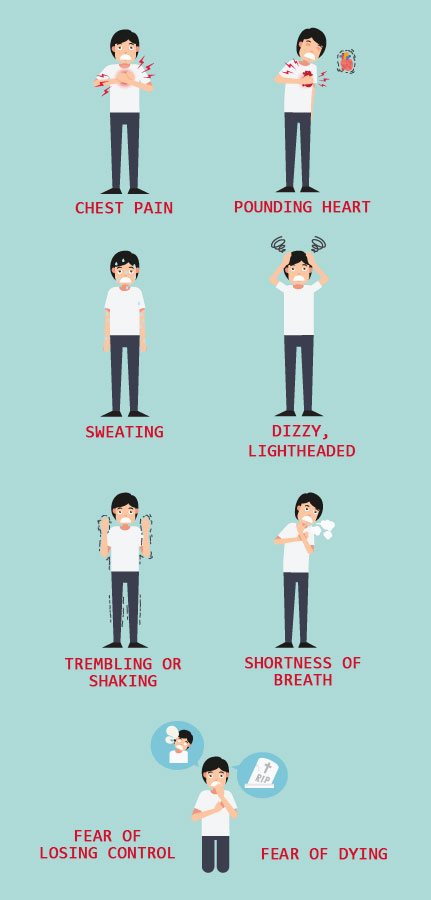
- Inability to concentrate.
- Inability to relax.
- Constant expectation of danger.
- Absentmindedness.
- Constant state of irritability.
- Feeling of tension.
- Remember that this will pass. During a panic attack, remember that these feelings will pass and will not cause physical harm, no matter how scary they may seem at the time. Panic attacks usually reach their peak within 10 minutes of onset, and then the symptoms begin to subside. nine0073
- Breathe deeply. Try to breathe slowly and deeply, concentrating on each breath.
- Find a quiet place. How to help yourself with a panic attack? Sights and sounds can often intensify a panic attack. If possible, try to find a quieter place. This could mean leaving a busy room or moving to lean against a nearby wall.
- Focus on the object. How to quickly stop a panic attack? When you are overwhelmed with disturbing thoughts, feelings, or memories, focusing on something physical in your environment can help you feel grounded.
 nine0073
nine0073 - Go for a walk or light exercise. How to deal with panic attacks on your own? Walking can take you out of a stressful environment, and walking rhythm can also help regulate your breathing.
- Learn your triggers. I have panic attacks, what should I do? A person's panic attacks can often be caused by the same things, such as an enclosed space or a crowd. By learning to manage or avoid your triggers, you can reduce the frequency and intensity of your panic attacks. nine0073
- Keep lavender handy. How to quickly relieve a panic attack? Lavender is a traditional remedy that many people use for stress relief and relaxation.
- Look at 5 separate objects. Think about each for a moment.
- Listen to 4 different sounds. Think about where they come from and what makes them different.
- Touch 3 items. Think about their texture, temperature, and how to use them.
- Identify 2 different odors. It could be the smell of coffee, soap, or laundry detergent on your clothes. nine0073
- Name 1 thing you can try. Notice how it tastes in your mouth, or try tasting the candy.
- hold the voltage for 5 seconds;
- say "relax" by relaxing the muscle;
- allow the muscle to relax for 10 seconds before moving on to the next muscle.
- Remain calm. Even if you yourself are a little afraid, remain calm and try to calm the other person: reassure him that you will not leave; remind him that the attack won't last long; say the person is safe.
- Ask how you can help. What to do with a person with a panic attack? Most people who experience panic attacks or live with other types of anxiety have their own methods of dealing with them. When offering support, keep in mind that your loved one knows best what will help them the most.
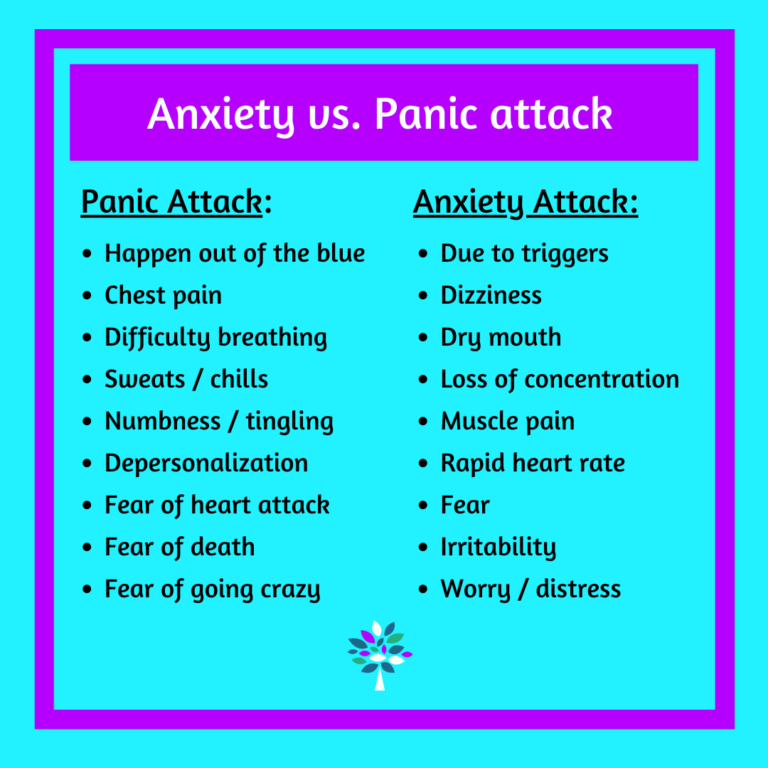 nine0073
nine0073 - Study the warning signs. If you haven't already, take the time to become familiar with how people behave during a panic attack. Not everyone experiences panic attacks in the same way, so it's best to ask what signs your loved one tends to experience. The sooner you understand what's going on, the sooner you can help.
- Make your words more effective. Instead of phrases like “don't worry” or constant questions like “are you okay”, say more specific phrases. Ask if the person would like to leave the room and go somewhere else; remind him to keep breathing; engage him in light conversation if he says he doesn't want to talk. nine0073
- Cognitive behavioral therapy (CBT). CBT teaches different ways of thinking, behaving, and responding to feelings during or before a panic attack. Attacks can become less frequent if you learn to respond differently to the physical feelings of anxiety and fear during a panic attack. nine0073
- Exposure therapy is a common cognitive behavioral therapy that focuses on confronting the fears and beliefs associated with panic disorder to help you engage in activities you have been avoiding.
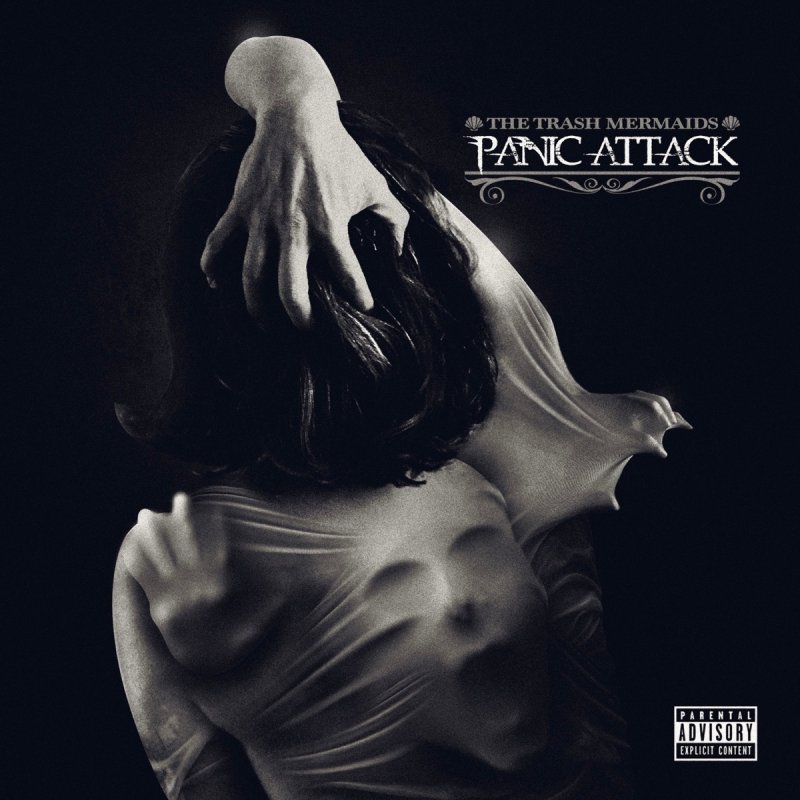 Exposure therapy is sometimes used in conjunction with relaxation exercises.
Exposure therapy is sometimes used in conjunction with relaxation exercises. - Antidepressants such as selective serotonin reuptake inhibitors (SSRIs) and serotonin-norepinephrine reuptake inhibitors (SNRIs).
- Beta blockers.
- Anti-anxiety drugs such as benzodiazepines.
- corvalol for panic attacks;
- glycine for panic attacks;
- bifren for panic attacks;
- quetixol for panic attacks;
- Novo-Passit, Persen, Valemedin.

Count the number of yes answers. If you got 10 or more “yes” answers, then most likely you are prone to developing panic attacks.
Important! This test does not provide an accurate assessment or diagnosis of a possible disorder. If you get a positive result, seek help from a psychotherapist.
Symptoms of panic attacks
Symptoms of a panic attack
How do the symptoms of a panic attack appear? The main signs of a panic attack in humans:
How to tell a panic attack from a stroke
Panic attack or stroke? Although they share a number of similarities, the two conditions result from very different disease processes. Panic attacks occur when stress hormones trigger the body's "fight or flight" response, often resulting in a racing heart, chest pain, and shortness of breath. In the event of a heart attack, blockage of a coronary artery can lead to the same symptoms. Chest pain, heart palpitations, and shortness of breath can occur when not enough blood reaches the heart muscle. nine0003
One of the key differences between the two is that a heart attack often develops during exercise, while a panic attack can occur at rest.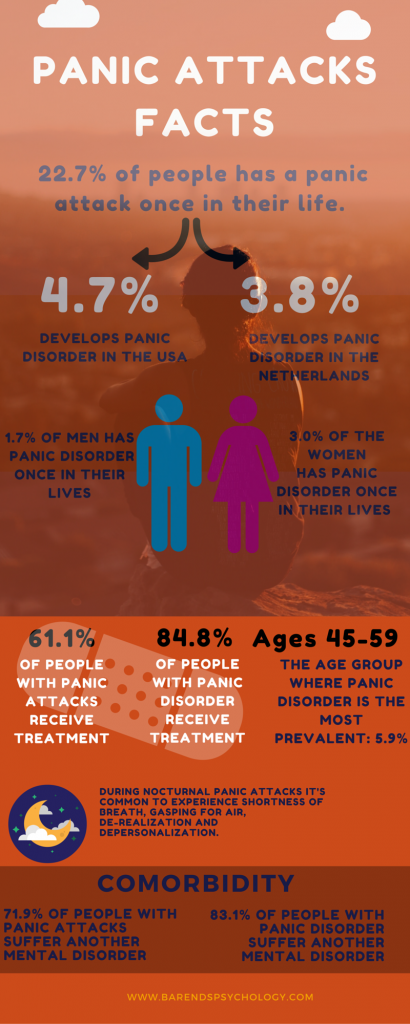 Both panic attacks and strokes can occur fairly quickly, but strokes are almost always instantaneous, while a panic attack usually peaks in about 10 minutes and then slowly subsides.
Both panic attacks and strokes can occur fairly quickly, but strokes are almost always instantaneous, while a panic attack usually peaks in about 10 minutes and then slowly subsides.
How to distinguish between hypertension and panic attacks
How to distinguish between a hypertensive crisis and a panic attack? A panic attack can lead to high blood pressure. Hypertension or panic attack? A panic attack causes many physical symptoms, including an increased heart rate and shallow breathing, which can cause a temporary increase in blood pressure to be confused with hypertension. However, despite all the similar symptoms, panic attacks do not cause long-term high blood pressure (hypertension). Episodes of anxiety can only cause sudden temporary spikes in blood pressure. nine0003
What to do about a panic attack
Panic attacks can be frightening and can overwhelm you quickly. Here are strategies you can use to try to stop or deal with panic attacks. Some may help you in the moment, while others may help you in the long run.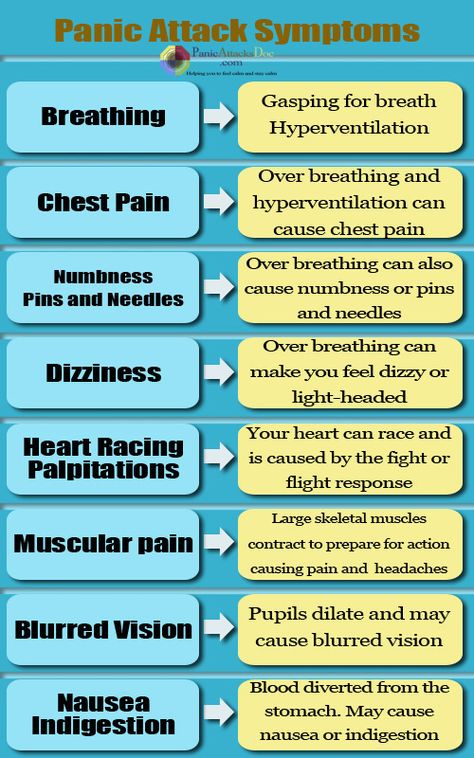
How to deal with a panic attack - on your own
Panic Attack Meditations
Meditation is an effective way to deal with panic attacks when you're in the middle of one, or as a way to reduce your stress levels and make them less likely. Here are some of the most common meditation techniques for panic attacks:
Breathing meditation
Mindful breathing
Lie down and put your hands on your chest. Never try to control your breathing. Just notice how your breath rises and falls on your palms.
Never try to control your breathing. Just notice how your breath rises and falls on your palms.
Lengthen your exhalations
Inhale as deeply as you can, but concentrate on exhaling, saying "O" with your mouth, and then exhaling as much as you can.
Square breath
Inhale for four seconds, hold your breath for four seconds, exhale for four seconds, and then hold your breath for another four seconds.
Abdominal breathing
Lie down or sit in a comfortable position. Place your hand on your stomach and inhale deeply until your stomach expands with your breath. Then exhale from the lower abdomen, all the way out of the mouth until your breath is released.
Mantra meditation
Another meditation technique for panic attacks is the “mantra”. A mantra is a word, phrase or sound that helps focus and gives strength. Repeating a mantra internally can help a person come out of a panic attack.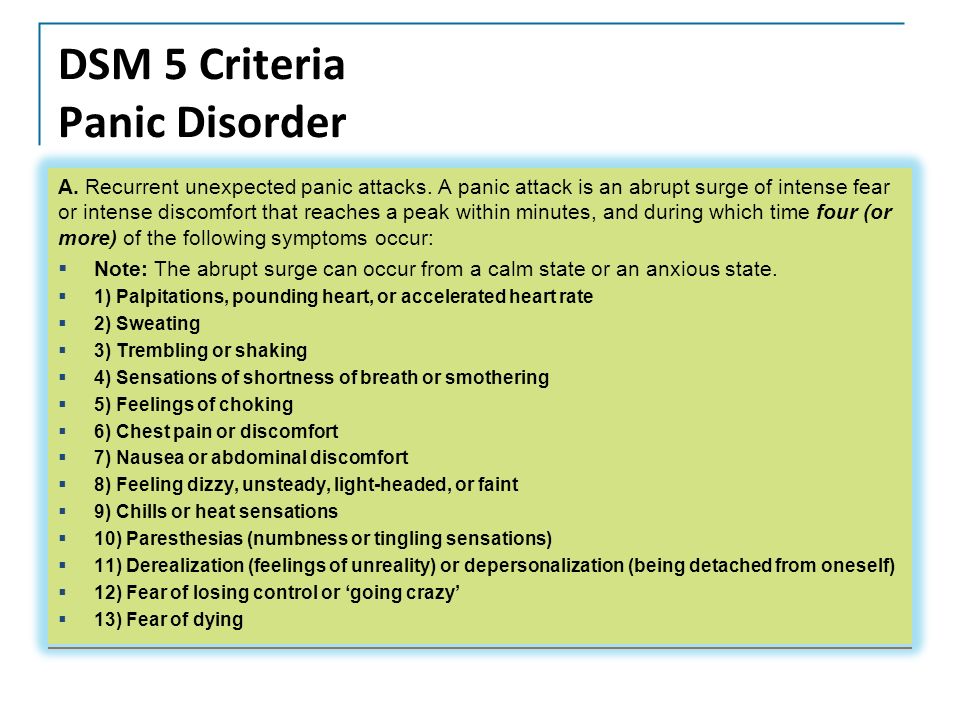 The mantra should be a simple positive statement, such as "This will pass now" or "This is just my anxiety saying - I know I'll be fine soon." Repeating positive affirmations to yourself or out loud can help interrupt the flow of negative thoughts you are experiencing and reduce anxiety. nine0003
The mantra should be a simple positive statement, such as "This will pass now" or "This is just my anxiety saying - I know I'll be fine soon." Repeating positive affirmations to yourself or out loud can help interrupt the flow of negative thoughts you are experiencing and reduce anxiety. nine0003
Panic Attack Exercises
Method 4-7-8
People can also try breathing exercises for panic attacks - 4-7-8 breathing or "relaxation breathing". With this technique, the person inhales for 4 seconds, holds the breath for 7 seconds, then exhales slowly for 8 seconds.
Method 5-4-3-2-1
Panic attacks can make a person feel disconnected from reality. This is due to the fact that the intensity of anxiety can prevail over other feelings. Panic attack exercises include the 5-4-3-2-1 method, which is a type of grounding technique and a type of mindfulness. This helps to divert the attention of the person from the sources of stress.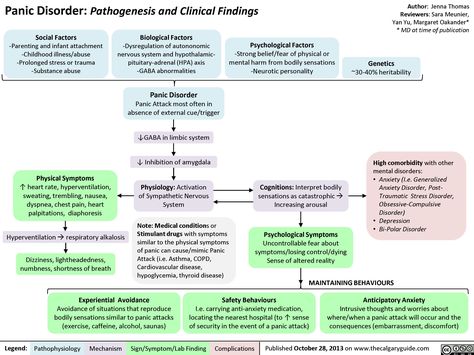 nine0003
nine0003
To use this method, the person must slowly and carefully perform each of the following steps:
Muscle relaxation method
Another symptom of panic attacks is muscle tension. Practicing muscle relaxation can help limit an attack. This is because if the mind feels like the body is relaxing, other symptoms such as rapid breathing may also decrease.
A technique called progressive muscle relaxation is a popular method for dealing with anxiety and panic attacks.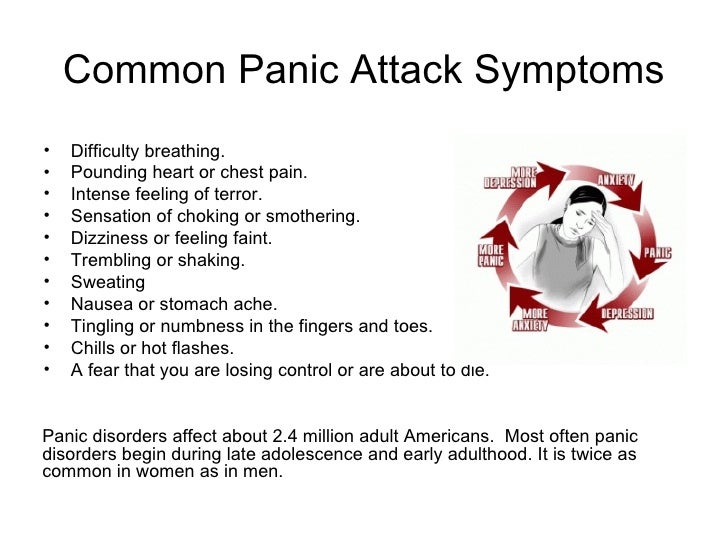 This involves tensing and then relaxing the various muscles in turn. Performing an exercise for a panic attack:
This involves tensing and then relaxing the various muscles in turn. Performing an exercise for a panic attack:
How to help someone with a panic attack
What to do if another person has a panic attack? If you are in a situation where someone has a panic attack in your presence, here are a few ways you can help:
Panic attack at night
What should I do if I have a panic attack at night? Try doing something relaxing to switch your focus, like meditating, listening to soothing music, reading a book, or even doing housework like ironing. Panic attack at night, how to calm down? Return to bed only when you feel tired again and are ready to sleep.
How to get rid of panic attacks
How to get rid of panic attacks? There are two main methods of getting rid of panic attacks: psychotherapy (without pills), drug therapy, and a combination of both. Which Doctor Treats Panic Attacks? Depending on the severity of the disease, the psychotherapist selects the appropriate treatment. nine0003
Panic attack treatment
How are panic attacks treated? Treatment of panic attacks in Kyiv involves the use of the most popular method in psychotherapy - cognitive behavioral therapy.
Medicines for panic attacks
Medicines may be useful in the treatment of panic disorder and panic attacks, especially when combined with psychotherapy. If you are experiencing symptoms of anxiety or panic, talk to your healthcare provider about medications that may be right for you. Various types of medications for panic attacks can be effective, including:
What to drink during panic attacks? You can also drink a sedative to quickly help with a panic attack. However, it is important to remember that it will not eliminate the root cause of the disease, but only temporarily relieve its symptoms. Top medicines for panic attacks include:
